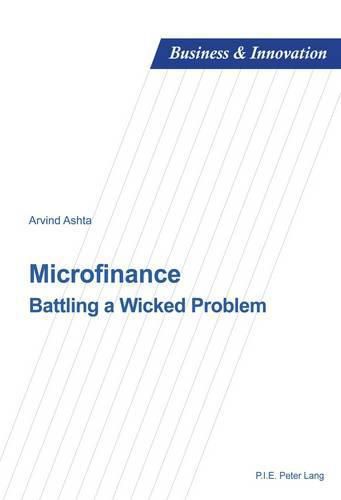Readings Newsletter
Become a Readings Member to make your shopping experience even easier.
Sign in or sign up for free!
You’re not far away from qualifying for FREE standard shipping within Australia
You’ve qualified for FREE standard shipping within Australia
The cart is loading…






A school of thought hails microcredit as a social innovation, a messiah to enable people to help themselves out of poverty through entrepreneurship. An opposing school of thought considers microcredit as a capitalist demon ensnaring the poor in poverty and debt. The layman and the million professionals working in this industry are at a loss to make sense of the stories that circulate about microcredit. This book provides this sense-making, useful for students, professionals, investors and researchers who are attracted to this field. Poverty is a wicked problem, akin to Hydra, the Greek mythological monster with many heads. As microcredit tries to balance multiple objectives to grapple with these multiple heads, it has needed to shift the weapons it uses. The arsenal for this battle has needed new philosophies, changing ethics, differing missions, institutional partnerships, the latest technologies and new products. These rapid innovations have differed in speed across the world, with adaptations in developed and developing countries. This book presents these with many case studies and field research. It is clear that development initiatives, no matter how financial, cross academic disciplines. At the very least, they affect disciplines such as economics, business management, sociology, history, geography, politics, legal systems in place, as well as science, which is evolving at such a high speed. The book provides this multidisciplinary view and motivates future research and practices.
$9.00 standard shipping within Australia
FREE standard shipping within Australia for orders over $100.00
Express & International shipping calculated at checkout
A school of thought hails microcredit as a social innovation, a messiah to enable people to help themselves out of poverty through entrepreneurship. An opposing school of thought considers microcredit as a capitalist demon ensnaring the poor in poverty and debt. The layman and the million professionals working in this industry are at a loss to make sense of the stories that circulate about microcredit. This book provides this sense-making, useful for students, professionals, investors and researchers who are attracted to this field. Poverty is a wicked problem, akin to Hydra, the Greek mythological monster with many heads. As microcredit tries to balance multiple objectives to grapple with these multiple heads, it has needed to shift the weapons it uses. The arsenal for this battle has needed new philosophies, changing ethics, differing missions, institutional partnerships, the latest technologies and new products. These rapid innovations have differed in speed across the world, with adaptations in developed and developing countries. This book presents these with many case studies and field research. It is clear that development initiatives, no matter how financial, cross academic disciplines. At the very least, they affect disciplines such as economics, business management, sociology, history, geography, politics, legal systems in place, as well as science, which is evolving at such a high speed. The book provides this multidisciplinary view and motivates future research and practices.